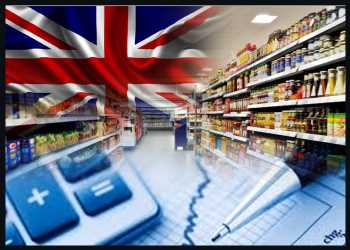UK Inflation At 41-Year High

UK consumer price inflation reached a 41-year high in October driven by household energy and food prices, official data showed on Wednesday, ahead of the much-awaited budget announcement.
Consumer prices grew 11.1 percent on a yearly basis, following September’s 10.1 percent increase. The rate was the highest since October 1981 and well exceeded economists’ forecast of 10.7 percent.
Despite the introduction of the government’s Energy Price Guarantee, gas and electricity prices made the largest upward contribution to annual inflation. Food and non-alcoholic beverages also made a large upward contribution, with prices rising 16.2 percent.
Without the implementation of the EPG, inflation would have risen to around 13.8 percent in October, the ONS said.
Excluding energy, food, alcoholic beverages and tobacco, core inflation held steady at 6.5 percent in October, while the rate was forecast to slow marginally to 6.4 percent.
The Bank of England had forecast inflation to peak at around 11 percent in the fourth quarter of this year. Nonetheless, the bank expected inflation to return to the 2 percent target in two years’ time.
At the November meeting, the BoE had delivered its biggest rate hike in 33 years to bring inflation down from double-digits.
“While the Bank of England seeks to control inflation through further interest rate rises, this is a blunt instrument that fails to address the core drivers of inflation for most firms: soaring energy costs, global supply chain disruption, and rising staff costs due to labour shortages,” British Chambers of Commerce Head of Research, David Bharier said.
“With signs that inflation – both in core and headline terms – is close to or at a peak, and signs of recession mounting, we think the Bank of England is likely to pivot back to hiking in 50bp increments in December,” ING economist James Smith said. The peak for the bank rate is likely to be around 4 percent.
Chancellor Jeremy Hunt said “tough but necessary decisions on tax and spending” would be taken in his autumn budget on November 17.
“It is our duty to help the Bank of England in their mission to return inflation to target by acting responsibly with the nation’s finances,” Hunt said.
Month-on-month, consumer price inflation surged to 2.0 percent from 0.5 percent in September, data showed. Prices were expected to gain 1.7 percent.
Factory gate inflation eased to 14.8 percent in October from 16.3 percent a month ago as the monthly fall in petroleum prices provided a large downward contribution, the ONS said in a separate communiqué. Economists had forecast prices to climb 14.6 percent.
On a monthly basis, output price inflation remained unchanged at 0.3 percent and remained above the forecast of 0.5 percent.
Input prices logged a double-digit annual growth of 19.2 percent, but slower than September’s 20.8 percent increase. Prices were expected to grow 18.0 percent.
On a monthly basis, input prices gained 0.6 percent, following a 0.9 percent rise in September. The monthly inflation was forecast to ease sharply to 0.3 percent.
Source: Read Full Article
